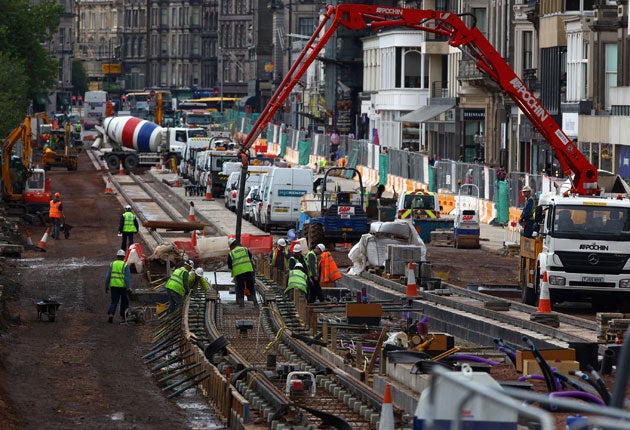Edinburgh, a city with tramlines – but still no trams
After more than 10 years in the pipeline, scrapping the project could cost as much as completing it

Your support helps us to tell the story
From reproductive rights to climate change to Big Tech, The Independent is on the ground when the story is developing. Whether it's investigating the financials of Elon Musk's pro-Trump PAC or producing our latest documentary, 'The A Word', which shines a light on the American women fighting for reproductive rights, we know how important it is to parse out the facts from the messaging.
At such a critical moment in US history, we need reporters on the ground. Your donation allows us to keep sending journalists to speak to both sides of the story.
The Independent is trusted by Americans across the entire political spectrum. And unlike many other quality news outlets, we choose not to lock Americans out of our reporting and analysis with paywalls. We believe quality journalism should be available to everyone, paid for by those who can afford it.
Your support makes all the difference.Visitors to the Edinburgh Fringe, which started on Friday, should by now have been able to arrive from the airport on the city's new tramline.
But although tracks have been laid along Edinburgh's main thoroughfare, Princes Street, there is no sign of the trams, as the project lies idle after being hit by delays, disputes and massive overspending. The February 2011 completion date passed, despite nearly half a billion pounds having already being spent. Now there are calls for the project to be scrapped.
In the late 1990s, Edinburgh City Council decided to build a light rail system and in 2003 the tram project was given the green light by the Labour government at Holyrood.
The estimated cost at the time was £375m. But the project has never run smoothly and costs have escalated. A new estimated final cost put forward last year was £ 545m. At the time of the latest audit, in May, £440m had been spent, with only 28 per cent of the project completed.
At the end of June, after a heated five-hour debate, the council voted to shorten the route: it will now run from the airport to St Andrew Square, near Waverley train station and the coach station. The St Andrew Square- to-Newhaven element will not be built, but this revised project will still cost £ 773m. A motion to scrap it entirely – which could cost as much as £750m in money already spent and cancelled contract fees – was defeated.
The tramline has been marred by disputes between Transport Initiatives Edinburgh (TIE), a company owned by Edinburgh Council, and its main contractor, Bilfinger Berger, over escalating costs and time overruns. TIE's chief executive in charge of the project, Richard Jeffrey, resigned in June after two years in the role, as did his predecessor, Willie Gallagher, after a similar length of time.
Last August, after complaints from taxi drivers and local businesses, Edinburgh Council, a Lib Dem/SNP coalition, decided to suspend works during the festivals. This year, work has simply ground to a halt as builders try to iron out problems and the council struggles with a £ 200m shortfall.
Labour's transport spokeswoman on the council, Lesley Hinds, is calling for the council leader, Jenny Dawe (Lib Dem), and her deputy, Steve Cardownie (SNP), to quit. She said a 2007 Audit Scotland report concluded that the project was deliverable and robust. "With good management and political leadership, I believe it was on course to be delivered. Since then, the project has totally unravelled, and we are left with the mess before us today."
While few are willing to criticise the project to the media, senior figures connected with the festivals privately express concern that city is being presented in a bad light. "Visitors to the Fringe must be aghast that there are still roads shut or diversions in the city centre so many years into the project," said one. "It makes us look incompetent on a grand scale."
The Scottish Executive is unlikely to come to the city's aid if the project stalls again. The SNP opposed it in 2003 and tried to scrap it in 2007 when part of a power-sharing government with Labour at Holyrood. The First Minister, Alex Salmond, said the Executive cannot increase its financial input, which is limited to £500m by a parliamentary vote, although last month he suggested his government would be "flexible".
But Scots voters are unlikely to view this kindly after previous problems with big projects. The Scottish Parliament building at Holyrood cost £431m, nearly 10 times its original estimate, and opened three years late in 2004. Mr Cardownie has called for a referendum: "This project is Holyrood on wheels. The trouble is, we haven't even seen the wheels yet."
Join our commenting forum
Join thought-provoking conversations, follow other Independent readers and see their replies
Comments